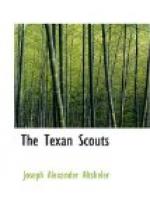Fannin lay against the breech of one of the cannon, blankets having been folded between to make his position easy. His wound was severe and he was suffering greatly, but he uttered no complaint. He had not shown great skill or judgment as a leader, but he was cool and undaunted in action. Now he was calling a council to see what they could do to release themselves from their desperate case. Officers and men alike attended it freely.
“Boys,” said Fannin, speaking in a firm voice despite his weakness and pain, “we are trapped here in this hole in the prairie, but if you are trapped it does not follow that you have to stay trapped. I don’t seek to conceal anything from you. Our position could not well be worse. We have cannon, but we cannot use them any longer because they are choked and clogged from former firing, and we have no water to wash them out. Shortly we will not have a drop to drink. But you are brave, and you can still shoot. I know that we can break through the Mexican lines to-night and reach the Coleto, the water and the timber. Shall we do it?”
Many replied yes, but then a voice spoke out of the darkness:
“What of the wounded, Colonel? We have sixty men who can’t move.”
There was an instant’s silence, and then a hundred voices said in the darkness:
“We’ll never leave them. We’ll stay here and fight again!”
Ned was standing with those nearest Fannin, and although the darkness was great his eyes had become so used to it that he could see the pale face of the leader. Fannin’s eyes lighted up at the words of his men, and a little color came into his cheeks.
“You speak like brave men rather than wise men,” he said, “but I cannot blame you. It is a hard thing to leave wounded comrades to a foe such as the one who faces us. If you wish to stay here, then I say stay. Do you wish it?”
“We do!” thundered scores of voices, and Fannin, moving a little to make himself easier, said simply:
“Then fortify as best you can.”
They brought spades and shovels from the wagons, and began to throw up an earthwork, toiling in the almost pitchy darkness. They reinforced it with the bodies of the slain oxen, and, while they toiled, they saw the fires where the Mexican officers rested, sure that their prey could not break from the trap. The Texans worked on. At midnight they were still working, and when they rested a while there was neither food nor drink for them. Every drop of water was gone long since, and they had eaten their last food at supper. They could have neither food nor drink nor sleep.
Ned had escaped from many dangers, but it is truth that this time he felt despair. His feeling about the hand of fate striking them down became an obsession. What chance had men without an ounce of food or a drop of water to withstand a siege?




